Batteries for MEWPs: The latest and most effective options
01 June 2023
The choices when it comes to batteries are getting wider as the industry finds solutions to make working in the field more sustainable and efficient.
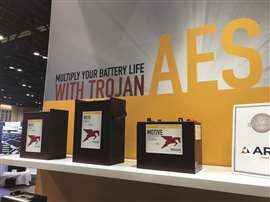 The new AES range from Trojan. (PHOTO: Trojan)
The new AES range from Trojan. (PHOTO: Trojan)
Energy storage and longevity are two of the big issues surrounding batteries and the provision of the electric power in the field.
Apart from the now well-established lithium solutions which provide greater storage capacities than lead acid and are maintenance free, as well offering longer life, battery producers are set on exploring all options.
The latest batteries on the equipment market
Trojan Battery has adapted its AGM line, based on core lead acid technology, with the new AES Battery, available in 6, 8 and 12-volt variations. It is described as a maintenance-free battery that is suitable for use in aerial platforms and material handling units.
It incorporates absorbent glass mat (AGM) technology and offers around 2,500 charging cycles, with no loss of performance even when units are partially charged.
According to the manufacturer, this is double the 1,200 cycles offered by traditional AGM units and means users will be able to “maximize productivity and slash their total cost of ownership”.
Trojan says, “Some traditional AGM batteries must be fully recharged after each cycle to prevent damaging partial state of charge (PSoC) operation.
“That doesn’t always happen, causing sulfation and corrosion, reducing battery life, and requiring frequent replacements.”
The Trojan AES Battery is optimised with a proprietary additive and its Deep-Cycle Series Technology, featuring paste formulations, means it can withstand daily repeated discharges.
Also featuring a durable design, the AES Battery can be used in temperatures ranging from as low as -40°F (-40°C) to 160°F (71°C). It also offers plug-and-play compatibility with chargers using AGM profiles.
On the subject of capacity, another solution is to bring additional capabilities to the field. Sunbelt Rentals, in the US, has signed a multi-million dollar deal with Moxion Power to purchase 600 of the company’s MP-75/600 mobile battery units.
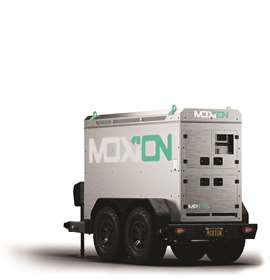 The MP-75/600 mobile battery unit. (PHOTO: Moxion)
The MP-75/600 mobile battery unit. (PHOTO: Moxion)
Clean mobile energy storage technology company Moxion Power offers a 100% electric solution to industries that have historically relied on generators.
The units have enough energy capacity to run for days or weeks before recharging is needed.
“Moxion’s batteries are virtually silent, produce no direct emissions, and can be charged with renewable energy, making them a cleaner and more sustainable solution than diesel generators,” said Paul Huelskamp, Moxion’s CEO and Co-Founder.
Industry collaboration on the rise
Mark Wilton, director of sustainable energy, Power & HVAC at Sunbelt Rentals, added, “Securing these batteries for our fleet supports our commitment to providing customers with solutions that can help them significantly reduce emissions.
“We are confident our partnership with Moxion is only the beginning and look forward to working together to provide clean, reliable energy to customer job sites.”
The agreement with Sunbelt Rentals follows a deal with Amazon Studios, which saw Moxion provide its mobile batteries to power Hollywood film and TV sets, replacing diesel generators.
From mobile units to optimising a MEWP’s integrated battery, the aim is to make work as easy as possible for the operator by maximising the capabilities of the units on site.
Integrated battery charging systems
Battery charger specialist Delta-Q is launching a charging system called the XV3300, which sees a 3.3 kW battery charger, a 500 W DC-DC converter to power the vehicles’ auxiliary loads and an EV charging station interface integrated together. These key features are encased in a ruggedized IP67 design.
The XV3300 charging solution is available in 58.8-, 65-, and 120-volt DC models and is scalable, allowing OEMs to stack up to three chargers for power levels up to 10 kW.
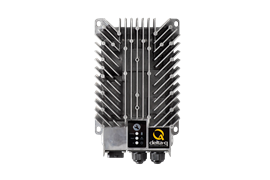 Delta-Q will also show the RQ700-1 at APEX. (PHOTO: Delta-Q)
Delta-Q will also show the RQ700-1 at APEX. (PHOTO: Delta-Q)
The 3.3 kW charger uses complex algorithms to deliver a precise charge to batteries of various chemistries and voltages, maximizing battery life and optimizing charge time.
The charger’s integrated DC-DC converter provides auxiliary power to operate vehicle accessories such as air-conditioners, controllers, lights, turn signals, navigation, and communication devices.
The advantages of lithium batteries
Indeed, battery maintenance and replacement is one of the biggest ongoing costs for scissor lift owners.
It is no wonder lithium is therefore becoming a go-to option for many MEWP manufacturers and customers.
Just one example of where manufacturers are making lithium partnerships is Genie with its E-Drive scissor lifts to offer 25% gradeability and 14° breakover angle.
For example, the GS-1932 E-Drive Lithium-Ion scissor lift is equipped with a zero-maintenance battery that has been rigorously tested for longevity and reliability, even in extreme temperature environments.
Designed specifically for use in MEWPs and certified by the independent Underwriters Laboratory (UL) against fire, electric shock and explosion, the units give four-hour charging time.
This is 33% faster than FLA batteries, and the ability to work a full shift on a single charge.
The lifts also offer E-Drive motors that are brushless and fully sealed against moisture and water for maintenance-free longevity.
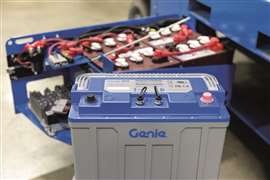 Genie’s E-Drive Lithium-Ion scissor battery system. (PHOTO: Genie)
Genie’s E-Drive Lithium-Ion scissor battery system. (PHOTO: Genie)
In addition, potential for hydraulic leaks is drastically reduced because E-Drive has 70% fewer hydraulic hoses and fittings.
While lithium options are proliferating in the industry, their use is under questions when it comes to long-term availability and their own impact on the environment through their recycling.
Roberta Prandi, writing for KHL Group’s New Power progress, points out it’s not just from an ethical point of view but also because lithium-ion batteries used in modern mobile equipment use various precious metals and other substances which if not suitably treated could be harmful to the environment.
The recovery of minerals used in batteries will also help with increasing battery production demand, for which the mining limits of such materials are not enough (currently 35% and 25% of mined lithium and cobalt respectively is used to produce lithium batteries).
The development of new generations of cells is therefore carefully considering the issue of materials shortages by bringing to market solutions that, for example, have a reduced percentage of cobalt, a material that among other things has a high environmental impact.
Cobalt-free lithium battery technology
There are however also lithium chemicals which are completely cobalt-free, as for example Flash Battery’s lithium ferro-phosphate (LFP) technology.
The company focused on LFP also because it best suits the needs of the industrial sector; according to Flash Battery, it is the safest and most stable technology to be sourced on the market, it is available in large-capacity formats, and it also has an exceptionally long lifetime (over 4000 recharging cycles).
Europe is not yet among the major players in recycling; currently most spent batteries are directed to China and South Korea: in 2018, 97 000 tonnes of lithium batteries were recycled, of which 67 000 in China, 18 000 in South Korea, and only the remaining amount in Europe.
It is estimated that in 2030 it will be possible to recover between €400 and €500 million per year (at current prices), considering aluminium, cobalt, nickel and lithium alone. It is also estimated that in 2025 spent batteries will constitute approximately 800 000 tonnes of minerals to be disposed of and recycled.
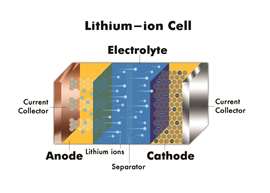 The composition of a lithium-ion cell.
The composition of a lithium-ion cell.
How battery recycling is developing
Currently, the lithium battery disposal and recycling process is mainly driven by the market value of their components, and their availability in recycling centres.
For this reason, in Europe and especially Germany, aluminium, copper and cobalt are the elements of major interest, as they are recovered in the form of ‘black mass’ metal alloys (mix of everything smelted) requiring additional steps to produce material that can be used directly for new batteries.
In Europe, Directive 2006/66/EC currently has the objective of recycling a minimum of 50% of spent lithium batteries by average weight, funding their collection, treatment and ultimately recycling.
Ensuring long-term sustainability will however require reaching the 95% target mentioned previously and that’s precisely one of the reasons why a new European battery regulation is being developed.
As a matter of fact, in the years to come the new lithium technologies will be implemented according to precise criteria in terms of a sustainable design, by avoiding the use of materials that harm the environment (e.g. cobalt) and by optimising or eliminating production processes that are particularly polluting. Future batteries will also need to be designed to facilitate an easy dismantling and an efficiency recycling.
STAY CONNECTED




Receive the information you need when you need it through our world-leading magazines, newsletters and daily briefings.
POWER SOURCING GUIDE
The trusted reference and buyer’s guide for 83 years
The original “desktop search engine,” guiding nearly 10,000 users in more than 90 countries it is the primary reference for specifications and details on all the components that go into engine systems.
Visit Now
CONNECT WITH THE TEAM










